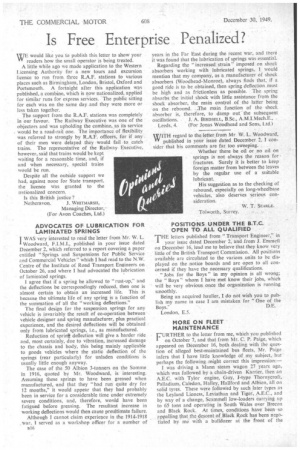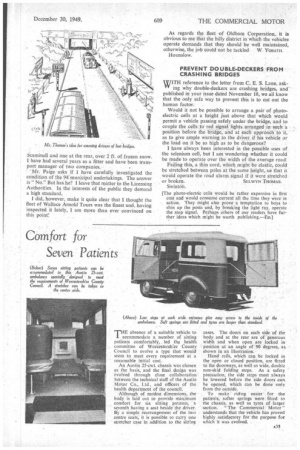Is Free Enterprise Penalized?
Page 50

Page 53

If you've noticed an error in this article please click here to report it so we can fix it.
WE would like you to publish this letter to show your " readers how the small operator is being treated.
A little while ago we made application to the Western Licensing Authority for a new tours and excursion licence to run from. three R.A.F. stations to various places such as Birmingham, London, Bristol, Oxford and Portsmouth. A fortnight after this application was published, a combine, which is now nationalized, applied for similar runs for express services. The public sitting for each was on the same day.and they were more or less taken together.
The support from the R.A.F. stations was completely in our favour. The Railway Executive was one of the objectors and was upholding the combine, as its service would be a road-rail one. The importance of flexibility was referred to strongly by R.A.F. officers, for if any of their men were delayed they would fail to catch trains. The representative of the Railway Executive, however, said that trains would be kept waiting for a reasonable time, and, if and when necessary, special trains would be run.
Despite all the outside support we had, against none for State transport, the licence was granted to the nationalized concern.
Is this British justice ?
Netheravon. J. WHITMARSH, ADVOCATES OF LUBRICATION FOR LAMINATED SPRINGS
I WAS very interested to read the letter from Mr. W. L. I Woodward, F.I.M.I., published in your issue dated December 2, which referred to a report covering a paper entitled "Springs and Suspensions for Public Service and Commercial Vehicles" which I had read to the N.W. Centre of the Institute of Road Transport Engineers on October 26, and where I had advocated the lubrication of laminated springs.
I agree that if a spring be allowed to "rust-up," and the deflections be correspondingly reduced, then one is almost certain to obtain an increased life. This is because the ultimate life of any spring is a function of the summation of all the "working deflections."
The final design for the suspension springs for any vehicle is invariably the result of co-operation between vehicle designer and spring manufacturer, plus practical experience, and the desired deflections will be obtained only from lubricated springs, i.e., as manufactured.
Reduction of sprint deflection will give a harder ride
and, most certainly, due to vibration, increased damage to the chassis and body, this being mainly applicable to goods vehicles where the static deflection of the springs (rear particularly) for unladen conditions is usually little enough anyway.
The case of the 50 Albion 3-tonners on the Somme in 1916, quoted by Mr. Woodward, is interesting. Assuming these springs to have been greased when manufactured, and that they "had run quite dry for 12 months," it would appear that they had probably been in service for a considerable time under extremely severe conditions, and, therefore, would have been fatigued before greasing. The resultant increase in working deflections would then cause preultimate failure.
Although I cannot claim experience in the 1914-1918 war. I served as a workshop officer for a number of B16 years in the Far East during the recent war, and there it was found that the lubrication of springs was essential.
Regarding the "increased strain" imposed on shock absorbers working with lubricated springs, I would mention that my company, as a manufacturer of shock absorbers (Woodhead-Monroe), always finds that, if a good ride is to be obtained, then spring deflection must be high and as frictionless as possible. The spring absorbs the initial shock with little assistance from the shock absorber, the main control of the latter being on the rebound. —The main function of the shock absorber is, therefore, to damp out the subsequent oscillations. J. A. BIRDSELL, B.Sc.,A.M.I.Mech,E.,
Leeds, 4. (For Jonas WoOdhead and Sons, Ltd.) WITH regard to the letter from Mr W. L. Woodward, " published in your issue dated December 2, I consider that his comments are far too sweeping. .
Whether there be oil or no oil on springs is not always the reason for fractures. Surely it is better to keep foreign matter from between the leaves by the regular use of a suitable lubricant.
His suggestion as to the checking of rebound, especially on long-wheelbase vehicles, also deserves serious consideration.
W. T. SEARLE. Tolworth, Surrey.
POSITIONS UNDER THE B.T.C. 'OPEN TO ALL QUALIFIED
THE letters published from "Transport Engineer," in your issue dated December 2, and from J. Emmett on December 16, lead me to believe that they know NTry little of the British Transport Commission. All positions available are circulated to the various units to be displayed on the notice boards and are open to all concerned if they have the necessary qualifications.
" Jobs for the Boys" in my opinion is all wrong; the " Boys " whom I have met know their jobs, which will be very obvious once the organization is running smoothly.
Being an acquired haulier, I do not wish you to publish my name in case I am mistaken for "One of the
Boys.D.E. London, E.5.
MORE ON FLEET MAINTENANCE FURTHER to the letter from me, which you published on October 7, and that from Mr. C. P. Paige, which appeared on December 16, both dealing with the question of alleged best-maintained bus fleets, Mr. Paige infers that I have little knowledge of my subject, but perhaps the following might correct this impression:— I was driving a Mann steam wagon 27 years ago, which was followed by a chain-driven Karrier, then an A.E.C. with Tylor engine, Guy, J-type Thornycroft, Palladium, Caledon, Halley, Hanford and Albion, all on solid tyres. These were followed by such later types as the Leyland Lioness, Leviathan and Tiger, .A.E.C., and by way of a change, Scammell low-loaders 'carrying up to 65 tons and operating in South Wales over Brecon and Black Rock. At times, conditions have been so appalling that the descent of Black Rock has been negotiated by me with a bulldozer at the front of the Scamine11 and one at the rear, over 2 ft. of frozen snow. I have had several years as a fitter and have been transport manager of two companies.
Mr. Paige asks if I have carefully investigated the condition of the 94naunicipal undertakings. The answer is " No." But has he? I leave that matter to the Licensing Authorities. In the interests of the public they demand a high standard.
I did, however, make it quite clear that I thought the fleet of Wallace Arnold Tours was the finest and, having inspected it lately, I am more than ever convinced on this point:
As regards the fleet of Oldham Corporation, it is obvious to me that the hilly district in which the vehicles operate demands that they should be well maintained, otherwise, the job could not be tackled. W YORATH.
Hounslow.
PREVENT DOUBLE-DECKERS FROM • CRASHING BRIDGES WITH reference to the letter from C. E. S. Lane, ask" ing why double-deckers are crashing bridges, and published in your issue dated November 18, we all know that the only safe way to prevent this is to cut out the human factor.
Would it not be possible to arrange a pair of photoelectric cells at a height just above that which would permit a vehicle passing safely under the bridge, and to couple the cells-to red signal lights arranged in such a position before the bridge, and at each approach to it, as to give ample warning to the driver if his vehicle or the load on it be so high as to be dangerous?
I have always been interested in the possible uses of the selenium cell, but I am wondering whether it could be made to operate over the width of the average road.
Failing this, a thin cord, which might be elastic, could be stretched between poles at the same height, so that it would operate the road alarm signal if it were stretched or broken. SELWYN THOMAS. Swinton.
[The photo-electric cells would be rather expensive in first cost and would consume current all the time they were in action. They might also prove a temptation to boys to shin up the posts and, by breaking the light ray, operate the stop signal. Perhaps others of our readers have further ideas which might be worth publishing.—ED.]




















































































